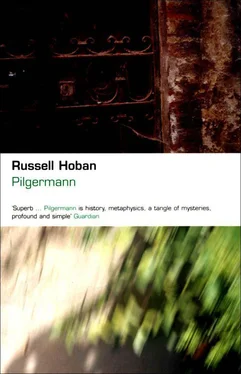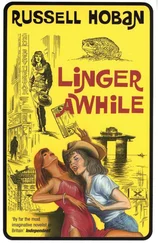Russell Hoban - Pilgermann
Здесь есть возможность читать онлайн «Russell Hoban - Pilgermann» весь текст электронной книги совершенно бесплатно (целиком полную версию без сокращений). В некоторых случаях можно слушать аудио, скачать через торрент в формате fb2 и присутствует краткое содержание. Год выпуска: 2002, Издательство: Bloomsbury Publishing PLC, Жанр: Современная проза, на английском языке. Описание произведения, (предисловие) а так же отзывы посетителей доступны на портале библиотеки ЛибКат.
- Название:Pilgermann
- Автор:
- Издательство:Bloomsbury Publishing PLC
- Жанр:
- Год:2002
- ISBN:нет данных
- Рейтинг книги:5 / 5. Голосов: 1
-
Избранное:Добавить в избранное
- Отзывы:
-
Ваша оценка:
- 100
- 1
- 2
- 3
- 4
- 5
Pilgermann: краткое содержание, описание и аннотация
Предлагаем к чтению аннотацию, описание, краткое содержание или предисловие (зависит от того, что написал сам автор книги «Pilgermann»). Если вы не нашли необходимую информацию о книге — напишите в комментариях, мы постараемся отыскать её.
Pilgermann — читать онлайн бесплатно полную книгу (весь текст) целиком
Ниже представлен текст книги, разбитый по страницам. Система сохранения места последней прочитанной страницы, позволяет с удобством читать онлайн бесплатно книгу «Pilgermann», без необходимости каждый раз заново искать на чём Вы остановились. Поставьте закладку, и сможете в любой момент перейти на страницу, на которой закончили чтение.
Интервал:
Закладка:
I feel in this wall of stone something else that is happening; the idea of sorting comes into my mind. Walls by their nature do sort: by defining an inside and an outside they sort the insiders from the outsiders, they sort what is happening inside from what is happening outside. More than that: on this wall that girdles Antioch in the year 1098 I pick up a bit of broken stone and as I hold it in my hand I feel the sorting that goes on continually inside it: this way, that way, this way, that way, Christ in every stone with arms outspread, not raging as he judges between the elect on his right hand and the damned on his left; he has put himself into a state of perfect balance, he does not weigh with a scale, measure with a rule: he himself, abandoning all self, is the rule and the scale, the pointer that wavers on the beam. He is entranced, he makes no judgments although he is the judge: he is a necessary, an essential instrument in the sorting process and it is the process that has brought the instrument into being. I have seen this necessary instrument, this Christ-as-balance, carved in stone in the century after mine by Gislebertus on the tympanum of Autun Cathedral in Burgundy, that same Burgundy from where came some of those soldiers who sacked Barbastro and orphaned Salzedo in 1064. The sorting being necessary, the instrument appears.
I have understood so little in my lifetime! Now in the centuries of my deathtime I am just beginning to understand a little more but my consciousness is not continuous, I am only a mode of perception irregularly used by strangers. Perhaps there will never be the possibility for me to understand what Christ is. I understand that he was born from the idea of him — that he told me himself: ‘From me came the seed that gave me life.’ That he is essentially a sorter I also understand; the sorting of course follows on that disparity without which the universe could not maintain spin; I think that I knew that even before I read Plato’s Timaeus in which he says: ‘Motion never exists in what is uniform. For to conceive that anything can be moved without a mover is hard or indeed impossible, and equally impossible to conceive that there can be a mover unless there is something which can be moved — motion cannot exist where either of these is wanting, and for these to be uniform is impossible; wherefore we must assign rest to uniformity and motion to the want of uniformity.’
That good and evil should be sorted along with right and left, up and down, light and darkness and all other complementarities is clearly in the nature of things, and that Christ should be a medium of this sorting is also clearly in the nature of things; but the rest of what he is continually moves on ahead of my comprehension like a great whale cleaving cosmic seas; I try to grasp the essence of him but I grasp only the fading wake of his passage.
Where was I? The walls of Antioch, and we are waiting for news of the Turkish cavalry who took the Suwaydiyya road after the Franks. The question arises whether apparent consistency of manifestation is to be accepted as reality. May it not simply be the persistence of image in the eye of the mind? This Turkish cavalry, for example, this whole numerous appearance of horses, men, and weapons — does it in actuality remain the same from one moment to the next? May it not suddenly and without any noticeable change be a black dog, not numerous at all, just one single black dog trotting inseparable from its little black noon shadow, even in the twilight trotting with that same little noon shadow which is also the shadow of a small stone both moving and still? Or trees, not many, just a clump of trees in the stillness of the dawn. The roundness and solidity of the shadowed trunks like circling dancers under the tented leaves. Wine of shadows, shadow music fading, fading to the shout of day.
Those other horsemen, the Frankish horsemen, or whatever it is that has offered to the eye this appearance of Frankish horsemen, may they or it not be a broken cathedral, inexplicable in a distant desert, the spire no longer in unity aspiring to heaven but toppled in pieces, pointing only to the sand? Broken stones, broken stones singing broken songs, broken verses chopped abruptly off, odd words leaping suddenly into silence? From these broken stones, these hewn and carven broken stones, there puts itself together a broken stone angel of death towering over the dawn trees, bigger than the cathedral ever was, the stones of it continually toppling as it strides but bounding up again to move as arms or legs or as a head that turns this way and that, turning in its looking but unturning in its questing. Questing is the name of this death angel made of broken stones, Bohemond is the name of this Questing.
Now at last Bohemond has become altogether real to me, not to be understood — nothing can be understood, I see now — but to be seen with the same solidity and shadow-casting reality as the port that is approached by crossing the water at dawn so that it grows larger, larger in the eye, so that at last it is arrived at. So have I at last arrived at Bohemond in his aspect of the death angel named Questing, the many-horsed, many-hoofed many-faced striding of the broken stones, the broken cathedral that crosses seas and deserts and mountains, questing on the death-track of the mystery that is Christ.
14
Night passes, morning comes, surprised as always to find itself here. This morning is full of urgent motion, of horsemen trotting to and from Yaghi-Siyan’s palace, of shouted commands, of the slap and jingle of harness and the shuffling and snuffling and whinnying of horses as cavalrymen prepare for action. Action impends but does not come until the afternoon when a Turkish galloper clatters over the bridge, through the gate, and into the city with the news that the cavalry who rode out last night have ambushed the Franks returning from Suwaydiyya. The Turks have put the Franks to flight, have captured the wagons with the siege materials and are now on their way back with them.
Only a few minutes after the arrival of the Turkish galloper we on the wall see scattered horsemen coming from the direction of Suwaydiyya and making for the Frankish camp. These we guess to be Franks who have fled the ambush. Now the Frankish camp is in motion, they will be riding out to help their comrades. In Antioch the kettledrums are pounding; Yaghi-Siyan’s cavalry come pouring out through the bridge gate, thundering across the bridge to engage the Franks and keep them from reinforcing the others.
The Turks are able to hold the Franks for a time but suddenly here are Bohemond and Raymond with their forces regathered and their lances levelled. As always I see him at a distance, and I recognize Bohemond by the gathering of galloping warriors into a point; I know that only he can be that point, only he can be that ardent forwardness with his name cleaving the air before him. Surely by now his name is like the roar of the lion: it is more than a sound, it is that which makes the knees shake. The Turks cannot now move forward against the man and the name, they must wheel their horses round towards the bridge and the gate, must turn themselves in the saddle to loose their arrows at the baneful man, the baneful name that overwhelms them.
As it lives again in the eye of my mind it seems all in one moment that Yaghi-Siyan’s cavalry are galloping for their lives over the bridge while there rises stone by stone the tower of the Franks that will command the bridge and further tighten the blockade of Antioch. But before this can be done the Franks must recapture the building materials from the Turks, and for this must many Turks be killed.
On the far side of the river there is a Muslim cemetery, and this night the Turks come out of Antioch to bury their dead there. In the morning the Franks dig up the bodies, there is gold and silver to be taken from them. They use stones from the tombs in the building of their tower and this becomes a part of the picture in my mind, almost it seems to me that the tower is being built of dug-up Turkish corpses while yet the Turkish cavalry gallop for their lives across the bridge into Antioch. And in this same moment rises the other Tower, Tancred’s tower that will command the Ladhiqiyya Gate.
Читать дальшеИнтервал:
Закладка:
Похожие книги на «Pilgermann»
Представляем Вашему вниманию похожие книги на «Pilgermann» списком для выбора. Мы отобрали схожую по названию и смыслу литературу в надежде предоставить читателям больше вариантов отыскать новые, интересные, ещё непрочитанные произведения.
Обсуждение, отзывы о книге «Pilgermann» и просто собственные мнения читателей. Оставьте ваши комментарии, напишите, что Вы думаете о произведении, его смысле или главных героях. Укажите что конкретно понравилось, а что нет, и почему Вы так считаете.












